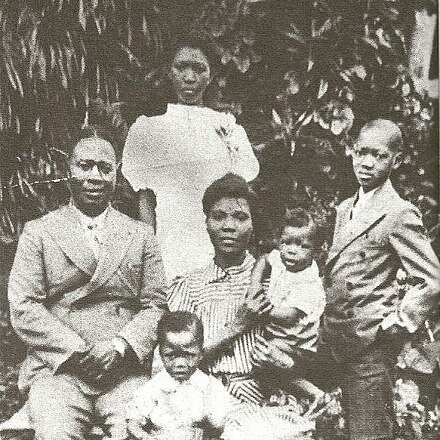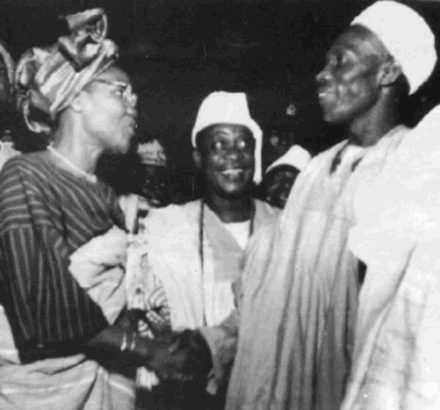Fumilayo Ransome Kuti was born in Abeokuta in what is now in Ogun State, and was the first female student to attend the Abeokuta Grammar School.
As a young adult, she worked as a teacher, organizing some of the first preschool classes in the country and arranging literacy classes for lower-income women.
During the 1940s, Ransome-Kuti established the Abeokuta Women’s Union and advocated for women’s rights, demanding better representation of women in local governing bodies and an end to unfair taxes on market women. Described by media as the “Lioness of Lisabi”, she led marches and protests of up to 10,000 women, forcing the ruling Alake to temporarily abdicate in 1949.


As Ransome-Kuti’s political influence grew, she took part in the Nigerian independence movement, attending conferences and joining overseas delegations to discuss proposed national constitutions. Spearheading the creation of the Nigerian Women’s Union and the Federation of Nigerian Women’s Societies, she advocated for Nigerian women’s right to vote and became a noted member of international peace and women’s rights movements.
Ransome-Kuti received the Lenin Peace Prize and was awarded membership in the Order of the Niger for her work.
In her later years, she supported her sons’ criticism of Nigeria’s military governments. She died at the age of 77 after being wounded in a military raid on family property. Ransome-Kuti’s children included the musician Fela Kuti (born Olufela Ransome-Kuti), doctor and activist Beko Ransome-Kuti, and health minister Olikoye Ransome-Kuti.
She was born to Chief Daniel Olumeyuwa Thomas (1869–1954), a member of the aristocratic Jibolu-Taiwo family, and Lucretia Phyllis Omoyeni Adeosolu (1874–1956).

Her father farmed and traded palm produce, and her mother worked as a dressmaker.
Frances’ father was born to Ebenezer Sobowale Thomas, who was himself born in Freetown, Sierra Leone, and Abigail Fakemi, who was born in the Yoruba town of Ilesa.
Frances’ oldest known paternal ancestor was her paternal great-grandmother, Sarah Taiwo (mother of Ebenezer Sobowale Thomas), a Yoruba woman who had been captured by slave traders in the early 19th century before eventually returning home to her family in Abeokuta. Sarah’s first husband was Sobowale Thomas. Sarah’s descendants through Thomas and her other two husbands – the Jibolu-Taiwos – became some of the first Christians in the area, and had a large influence on the growth of Christianity in Abeokuta.
Frances’ mother was born to Isaac Adeosolu, who was from Abeokuta, and Harriet, the daughter of Adeboye, who was from the ancient Yoruba town of Ile-Ife. Her parents married in 1897, and they had two children who died in infancy before Frances was born.
Although it was uncommon at the time for Nigerian families to invest in much education for girls, Frances’ parents believed in the importance of education for both boys and girls.[2]: 28 She attended Abeokuta Grammar School for her secondary education.
The school had initially been open only to male students, but it admitted its first female students in 1914, and Frances was first among the six girls registered for study that year.
From 1919 to 1922, she went abroad and attended a finishing school for girls in Cheshire, England, where she learned elocution, music, dressmaking, French, and various domestic skills. It was there that she made the permanent decision to use her shortened Yoruba name, Funmilayo, instead of her Christian name Frances.
likely in response to personal experiences of racism in England.[6] Afterwards, she returned to Abeokuta and worked as a teacher.
On 20 January 1925, Funmilayo married Reverend Israel Oludotun Ransome-Kuti, a member of the Ransome-Kuti family.
Israel had studied at the Abeokuta Grammar School several years ahead of Funmilayo, and while she was still in school the two had developed a friendship followed by a courtship.
Israel found work as a school principal, and he strongly believed in bringing people together and overcoming ethnic and regional divisions. He later became a co-founder of both the Nigeria Union of Teachers and of the Nigerian Union of Students.
His marriage with Funmilayo would last 30 years – until Israel’s death – and was marked by a sense of equality and deep mutual respect between the couple.
After marriage, Funmilayo Ransome-Kuti had quit her old job as a teacher, but she soon found other projects.
In 1928 she established one of the first preschool classes in Nigeria. Around the same time, she started a club for young women of elite families to encourage their “self-improvement”, while also organizing classes for illiterate women.
Between 1935 and 1936, the couple arranged to purchase a secondhand car and had it shipped to them from England. Ransome-Kuti was the first woman in Abeokuta to drive a car.
Ransome-Kuti and her husband had four children: a daughter named Dolupo (1926) and sons Olikoye “Koye” (1927), Olufela “Fela” (1938), and Bekololari “Beko” (1940)
Biographer Cheryl Johnson-Odim notes that Funmilayo Ransome-Kuti’s name remains well known throughout Nigeria and that “no other Nigerian woman of her time ranked as such a national figure or had [such] international exposure and connections”.
144 Nigerian activist Hajiya Gambo and politician Margaret Ekpo both named Ransome-Kuti as a strong influence on their work, 174 and Nigerian-British feminist writer Amina Mama has cited Ransome-Kuti’s activism as having shaped her personal beliefs and perspectives.
Ghanaian politician Kwame Nkrumah (later the first Prime Minister of Ghana) was heavily inspired by Ransome-Kuti in his early organizing of the Ghana Women’s Association.
In 2012, the Nigerian government proposed the inclusion of Ransome-Kuti’s image on the new N5000 currency note. In August of that year, Ransome-Kuti’s grandson, musician Seun Kuti, stated to media that he found the proposal “ludicrous to say the least”, in light of the government’s role in his grandmother’s death.
Kuti said that his family had never received an apology for the assault on their compound, with official government statements declaring that Ransome-Kuti had been attacked by “1000 unknown soldiers”.
Ransome-Kuti was portrayed in the 2014 film October 1 by actress Deola Sagoe.
On 25 October 2019, Ransome-Kuti was posthumously honored with a Google Doodle created by Nigerian-Italian illustrator Diana Ejaita.
Culled from Wikipedia

























![#Edodecides2024: Obaseki calls for calm, hints at legal action [VIDEO]](https://thediscovererng.com/wp-content/uploads/2024/09/download-6-3-120x86.jpeg)


